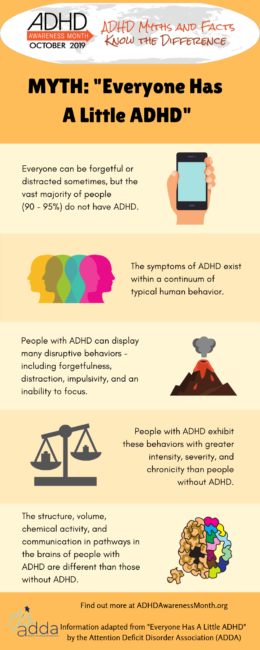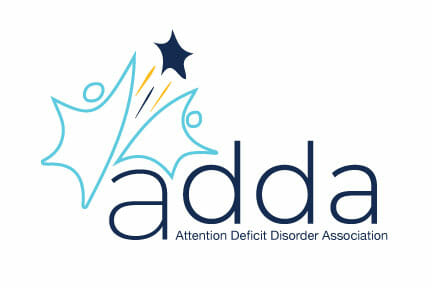Fact: Everyone does not have a physical difference in their brain.
by the Attention Deficit Disorder Association (ADDA)
When people say things like, “Everyone has a little bit of ADHD these days!” they mean everyone exhibits some behaviors like the symptoms of ADHD.
They don’t mean everyone has a physical difference in their brains. It’s more like, “Everyone is a little distractible, forgetful or impulsive these days!”
They probably don’t make these comments to be mean. They’re trying to “normalize” challenges. But declaring “everyone” has a “little bit” of ADHD is inaccurate. It is also hurtful and dismissive of the real struggles people with ADHD go through every day.
The symptoms of ADHD exist within a continuum of typical human behavior. Most people lose their keys from time to time. They tune out in meetings. They’re late to class. And they have trouble delaying gratification. But these behaviors are not the same as ADHD. They are human behaviors or experiences that occur for many reasons. With ADHD, the reason is neurological in origin. It is not a choice, a fluke, or a bad day.
ADHD is a brain-based, often chronic, lifelong syndrome.
It gets in the way of the smooth operation of self-regulatory functions of the brain. Ongoing neurological studies find many differences in the ADHD brain. The structure, volume, chemical activity and communication pathways in the brains of people with ADHD are different than those without.[1] [2] Scientists have linked several genes to the condition.[3]
People with ADHD show behaviors resulting from this inner dysregulation. These behaviors include forgetfulness, distractibility, impulsivity and an inability to focus. For people with ADHD, these behaviors are disruptive. And they happen more often, with greater intensity, severity, and chronicity than for people without ADHD.
Further, when people with ADHD try to change, they often can’t course-correct the way others can. People with ADHD have more negative consequences from their challenges than the average. They earn less and incur more debt. They struggle with academic and workplace performance. They even face greater risk of physical injury.[4]
It is true everyone can be forgetful and distracted sometimes; and it’s also true that the vast majority of people – around 90-95% – do NOT have ADHD[5].
About the Author
ADDA is the world’s leading adult ADHD organization. An international 501(c)3 non-profit organization, we were founded over twenty-five years ago to help adults with Attention Deficit Hyperactivity Disorder (ADHD) lead better lives. ADDA has become the source for information and resources exclusively for and about adult ADHD. We bring together scientific perspectives and the human experience to generate hope, awareness, empowerment and connections worldwide in the field of ADHD. If you’re an adult with ADHD, (or you love one), discover how we can help make your (or their) life better at add.org.
Resources
[1] Friedman, L.A., and Rapoport, J.L. Brain development in ADHD. Current Opinion in Neurobiology, Volume 30, 2015, Pages 106-111. https://doi.org/10.1016/j.conb.2014.11.007.
[2] Tang C, Wei Y, Zhao J, Nie J: Different Developmental Pattern of Brain Activities in ADHD: A Study of Resting-State fMRI. Dev Neurosci 2018;40:246-257. doi: 10.1159/000490289
[3] https://www.bbrfoundation.org/content/first-robust-genetic-markers-adhd-are-reported
[4] Matza, L. S., Paramore, C., & Prasad, M. (2005). A review of the economic burden of ADHD. Cost effectiveness and resource allocation : C/E, 3, 5. doi:10.1186/1478-7547-3-5


